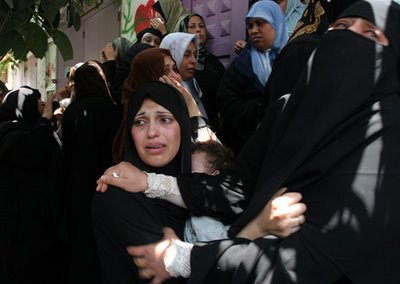The plight of Gaza.
 The old maxim goes that a society can be judged by how it treats its most vulnerable. Those imprisoned and at the mercy of the state are by definition the most at risk of ill-treatment.
The old maxim goes that a society can be judged by how it treats its most vulnerable. Those imprisoned and at the mercy of the state are by definition the most at risk of ill-treatment.By that definition, the enclave of Gaza is to all intents and purposes a prison, albeit an open air one patrolled from the air by helicopter gunships and remote-controlled drones. The two main exits from the strip, into Egypt and Israel respectively, are almost always shut, despite previous promises from Israel to keep them open, and even then exit is only possible through applications for visas, which are seldom issued. The irony is not lost on the people of Gaza that one of the few things guaranteed to get you out of the Strip is to be so seriously injured that the hospitals within the territory cannot cope with your injuries and so request a transfer to a hospital across the border.
For a number of months now Israel has been slowly but inexorably cutting the amount of power it allows into the Strip, ostensibly in response to the continuous fusillade of home-made rockets fired into Israel by the various militant groups, including Hamas, although strictly it is meant to be maintaining something approaching a ceasefire. Gaza's only power station, which was previously bombed by the Israelis during the 2006 incursion into Gaza which some argue prompted Hizbullah to launch its own raid into Israel, killing and capturing two soldiers, which in turn set-off the summer war between Hizbullah and Israel, cannot provide full power to the roughly 1.4 million Palestinians that live in the territory, and so the people partly depend on the supply into the Strip from Israel's own stations. Israel's move over the past week to an almost complete blockade meant that the station's dwindling supplies were almost down to nothing yesterday, and from being able to supply power for around 12 hours a day, those operating the station had no option but to plunge the territory into darkness. Combined with the economic blockade which has left farmers unable to sell their crops, the massive rise in unemployment and the relentless poverty that goes with it, Gazans are increasingly left to rely on food aid from charities and the UN.
Even this is now threatened by Israel's actions, which almost certainly constitute collective punishment, a war crime under the Geneva Convention. The sheer brazenness of Ehud Olmert, making clear that while live cannot go on as normal in the areas of Israel threatened by the sporadic, ineffective, impotent mortar fire, he'll make certain that life will also "not go on as usual" in Gaza, is the kind of bravado and belligerence which makes it incredibly difficult to believe that there's any chance of peace for years still yet to come. After all, what is exactly "usual" about life in Gaza? The only thing truly regular that we in the West see there is the protests and funerals; it's far too dangerous now for anyone other than local journalists to report on the territory, after Alan Johnson's kidnap last year, and so we hear very little about the crushing helplessness, the constant anger and fear, or the despair of a people that have long had all their hopes and dreams obliterated, of any kind of progress or improvement in their harsh lives.
But, says the neutral observer, wouldn't all this be ended and lifted if the Palestinians sorted themselves out and put a stop to the rocket fire? It would be lovely if things were so simple. The very firing of the Qassams is a sign of the weakness of the Gazans; they're the equivalent of a placebo, a weapon that makes those who fire them imagine that somehow it's resisting the Israelis, while all its doing is in fact contributing to the siege mentality. Even if Hamas decided to halt all the rocket fire tomorrow, the occupation itself would not be lifted, nor would the checkpoints be opened, or probably even the crops allowed through. The people would be back where they started, no better for anything that's occurred since the settlements were evacuated and the current policy of blockading the Strip was decided upon. Since Hamas seized the strip last year, the stranglehold has only tightened as Israel has tried to put pressure on the movement and dismally failed. Fatah's decision for its workers to strike in response only further put popular sentiment behind Hamas as the services disintegrated.
For the moment, Israel's casual inhumanity has been put checked somewhat by the international outcry, the only force which ever makes it so much as think twice, with Ehud Barak agreeing that the curbs will be diluted tomorrow so that fuel, food aid and medicines can be delivered. Then it will doubtless be back to the same old, with Israel making certain that Gaza cannot sleep, work or just exist while Sderot is threatened by fireworks that occasionally injure or kill, but do cause significant psychological distress. The same fear and anxiety that Gazans live with their entire lives. As Israel continues to make their short existence as miserable as possible, there will never be a shortage of the young ready to take the places of those killed or arrested in their small acts of defiance. For a young country that is meant to feel existentially threatened from all sides, it is remarkably cavalier about those within that, without a settlement to satisfy them, will only continue to fight.
Labels: Gaza, Hamas, inhumanity, Israel, Israel-Palestine, Qassam rockets


